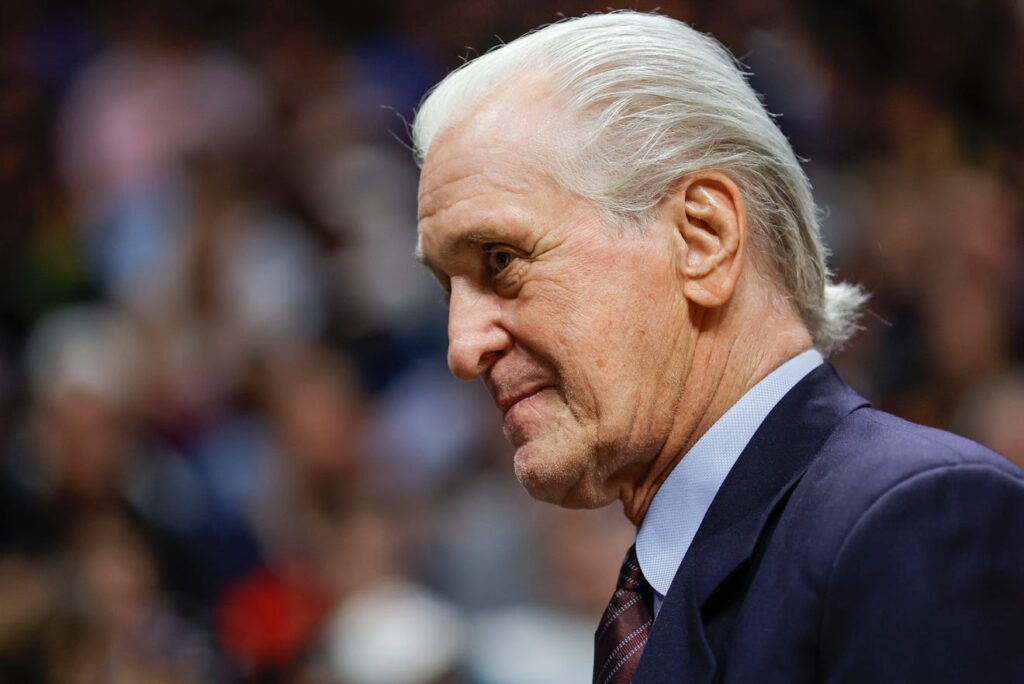
Most of Pat Riley’s end-of-season press conference Friday was tailored toward the franchise’s future. He didn’t have any opening statement–atypical for the Heat’s president–instead jumping into the meat and potatoes of the tumultuous season that was the 2024-25 Miami Heat season, plus brushing the surface of what is to come.
One of the fine details that Riley, 80, discussed was the luxury tax. Miami tried to get out of the luxury tax at the 2024-25 trade deadline, but was unsuccessful, becoming a tax team for the second-straight season.
Riley mentioned that a goal is attempting to avoid repeater tax penalties, triggered by being a luxury tax team in at least three of the previous four seasons.
“Now, because of these different CBA machinations — that have to do with repeater tax, the first apron, the second apron and the penalties that come with it — there’s a different thought process,” Riley said. “It’s a little bit different about how you plan now. It could come through trades. It could come through the addition of one or two very good players. There’s always still going to be with us, improvement from within. But I don’t think we can go there.
“I think we have to make an adjustment … I think we can handle that. This is not a priority, but it is in order to manage the final part of the team and the roster. And there’s a couple of teams that simply are so far over that they will start feeling the punitive consequences of draft picks being frozen or dropped to third or whatever. But I think we’ll probably try to get out and then get back and reset it.”
Miami has been a luxury tax team in each of the last two seasons; it paid a $15.3 million fee after 2023-24 and a $4.3 million fee after this season.
The Heat were trying to get under the tax ahead of February’s trade deadline with Kyle Anderson’s $8.8 million contract. They had a deal completed to send him to Toronto … until it wasn’t, with the Raptors backing out before they acquired Pelicans star forward Brandon Ingram.
Miami has roughly $9.4 million in luxury tax space heading into 2025-26, according to Spotrac. Though that’s before potentially re-signing Davion Mitchell, who is entering restricted free agency this offseason.
The league’s luxury tax threshold for 2025-26 is expected to be roughly $187.9 million.
The repeater tax penalties for being in the luxury tax will be far more onerous beginning next season, especially for teams who are at least $10 million into the tax. If you’re not a contender, there’s no point in triggering the repeater tax with how punitive the penalties become.
Miami did not pay the tax after 2020-21, 2021-22 or 2022-23. It has not been deeper than $10 million into the tax since 2012-13, according to Spotrac.
Riley made it known that the Heat weren’t going to “RIB it,” (run it back) but not only does it take two to tango, we don’t know the line of delineation between what “running it back” means versus the inverse; we all probably have different definitions of it. Changes will be made, but how drastic?
***
To check out our other content, click here.
Follow Hot Hot Hoops on Twitter/X here!
Follow Hot Hot Hoops on Instagram here!
Subscribe to our YouTube channel here!
- Pat Riley hints at Heat ducking luxury tax to avoid repeater tax penalties
- Recap of Pat Riley’s 2025 End of Season Press Conference
- 2025 NBA Draft: 7 names to keep an eye on for Heat with 20th pick
- Hanifan: 10 things I was wrong about with the 2024-25 Miami Heat
- Report: Heat won’t offer all three tradable firsts for Kevin Durant
- 3 important roster-building requirements that Heat must adopt for sustained success
- NBA trade rumors: Could the Heat really be in on the Giannis Antetokounmpo sweepstakes?

If the Heat runs it back with the following starting group and rotation players from day 1, what kind of record do you think they would have at the end of the season?
(Note: I have included player’s current ages.)
STARTERS:
Mitchell (26), Herro (25), Wiggins (30), Bam (27) and Ware (21)
ROTATION PLAYERS
Smith (27), Larsson (24), Jaquez (24), Johnson (23) and Jovic (21)
Include 2025 draft pick in rotation, if/when he is ready
PERSONNEL CONTRACT DECISIONS
Sign Mitchell for 4 years $10M-$12M per yearConsider re-signing Burks (33) to a minimum contract, if it makes senseBuy Robinson (31) out for $9,888,000 and save $10,000,000 -or- exercise team option and sign him for $19,888,000 and trade him for the best possible player or as part of a trade package for a higher salaried player. (A player with a team option can be traded before the team exercises or declines the option, as long as the trade happens before the end of the season and before June 30). Buy Love (36) out for 1/2 of his $4,150,000 salary ($2,075,000) and offer him a coaching/consultant position.Attempt to trade players with expiring contracts (Highsmith (28), Anderson (31) and Rozier (31) for younger players and/or draft picks and/or cash. Worse case scenario, play them sporadically or in cases of injuries, until they can be traded, bought out or their contracts expire, whichever comes first. Note:
Although there may be a market for Robinson, Highsmith and Anderson, it is unlikely that a team would want Rozier, unless it is strictly for salary cap purposes. Expiring contracts, especially large ones, free up significant salary cap space when they end, allowing teams to spend more money on future players. This can be crucial for teams looking to upgrade their roster or sign high-profile free agents. That is why all three contracts, plus Robinson’s are so valuable to Miami. They total over $61M and can be off the books after 2025-2026, one way or another.
Meanwhile, if “killer deals” (offers we can’t refuse) involving starters or rotation players come up at any time before the February trade deadline, they can be evaluated on an individual basis. Who knows, maybe a gift will drop out of the sky (although I wouldn’t bank on it).
As noted, the repeater tax can be egregious. It can limit who you can sign, for how much, make trades harder to complete, and even affect your draft picks. I know people don’t like to hear that, but it’s not like other sports where you can spend any amount you’re able to.
Exactly why Heat needs to use this summer, 2025-2026 season and next summer to draft 2 players, get rid of players on expiring contracts, evaluate young players and develop a strategic plan for the future.
I don’t disagree. But I still don’t think that will happen. I would rather you and others be right on this one however.
“The repeater tax penalties for being in the luxury tax will be far more onerous beginning next season, especially for teams who are at least $10 million into the tax. If you’re not a contender, there’s no point in triggering the repeater tax with how punitive the penalties become.”
I hope Riley doesn’t act impulsively and try to fix the problem all at once by trading away the future the way Phoenix did.
I think they’ll find a way out of the tax to avoid getting hit with the repeater.